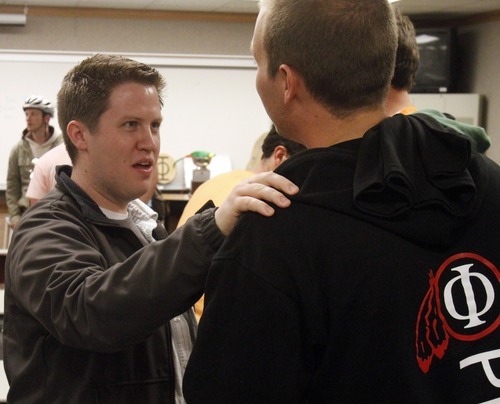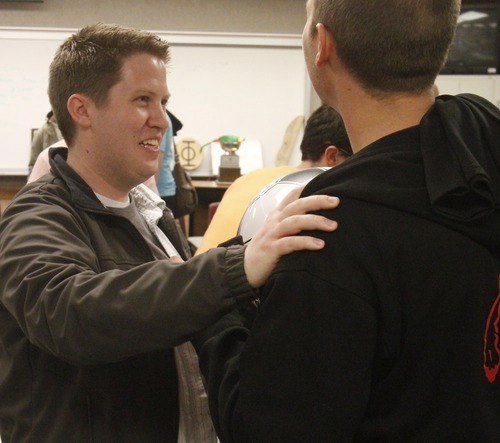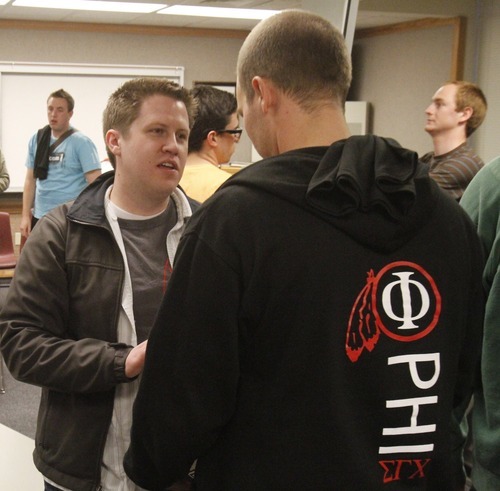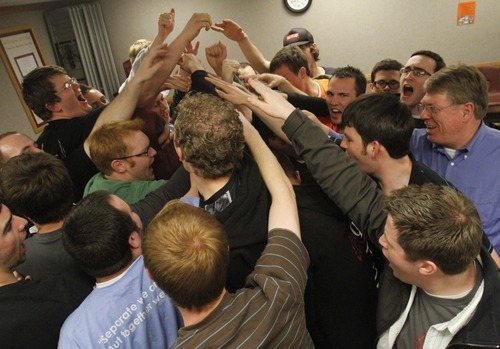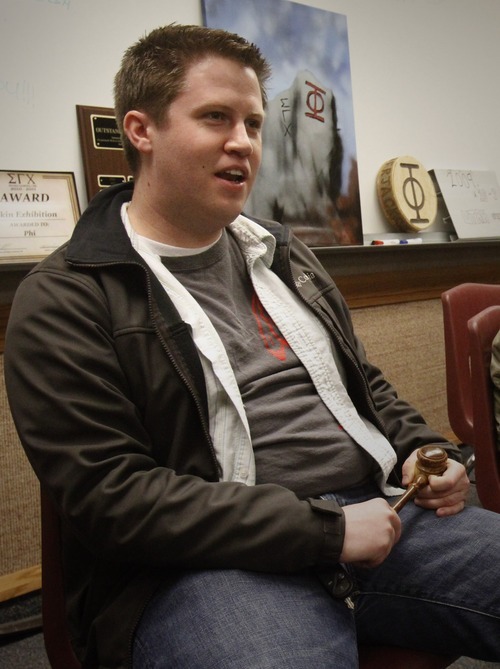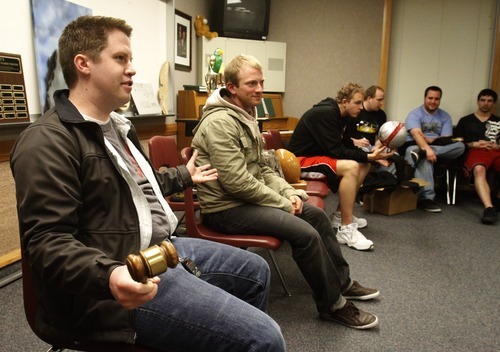This is an archived article that was published on sltrib.com in 2011, and information in the article may be outdated. It is provided only for personal research purposes and may not be reprinted.
John Evans is in no hurry to get married.
The 25-year-old returned LDS missionary lives with his parents in east Salt Lake City. He works full time, pursuing classes at night for a degree in English (with minors in Spanish and business) at the University of Utah. With law school looming, he is building up his savings before courting seriously.
Evans goes on some dates, but they tend to be expensive — dinner and a movie, maybe — so he prefers developing friendships first. Sometimes he finds it easier just to hang out with the guys at his LDS fraternity. Sure, his dad got married at age 24, but what's a couple of years' difference?
"My dating pace is right for me," Evans says. "I don't feel stressed."
That kind of modern nonchalance is what may be worrying LDS President Thomas S. Monson and other Mormon leaders, who addressed the issue head-on at last weekend's General Conference.
"Brethren, there is a point at which it's time to think seriously about marriage and to seek a companion with whom you want to spend eternity," Monson said at Saturday night's all-male priesthood meeting. "If you choose wisely and if you are committed to the success of your marriage, there is nothing in this life which will bring you greater happiness."
Apostle Richard G. Scott spoke even more emphatically the next day.
"If you are a young man of appropriate age and are not married, don't waste time in idle pursuits," Scott urged. "Get on with life and focus on getting married. Don't just coast through this period of life."
Their concern is natural. After all, marriage is a core LDS teaching and temple marriage is a prerequisite for the highest Mormon heaven.
But LDS leaders may be fighting a cultural shift. Traditional dating is almost a quaint custom on college campuses, where more and more young people hang out in groups or "hook up" for casual sex. Students also are investing in education and worrying about their financial stability — no small concern after the Great Recession — then cohabiting in their 30s before tying the knot – if at all.
"People in the country are pairing up," says Brigham Young University sociologist Marie Cornwall, who teaches a class in family and social change. "They're just not getting married."
This is hardly a new concern for LDS leaders. Past church presidents also counseled young Mormon men not to delay marriage. But there is a new urgency.
The median age for a first marriage in the United States has climbed to 25.8 for women and 27.4 for men. (Of course, people live longer nowadays, too.) In Utah, the median age for first-time brides has jumped from 20 in 1970 to 22 in 2008 (the latest available data) and from 22 to 24 for first-time grooms.
In one informal survey at the U.'s LDS institute, many young men said 30 was the best age at which to marry.
So what's slowing down Mormons?
The picture is complicated, especially in individual cases, social scientists and LDS teachers say, but a clear trend is evident: Today's young Latter-day Saints are not nearly as confident in the future, in their economic well-being or in their choices as their parents were.
"I really do plan on finding someone," Evans says, "and getting married."
Just not yet.
—
Finances, fear and finickiness
In his conference address, Monson placed the blame for Mormon men's marital foot-dragging on financial anxiety, insistence on finding a "soul mate" and having too much fun being single.
Then the LDS leader, considered a "prophet, seer and revelator" by the 14 million Mormon faithful, offered an antidote for the first two.
There is no shame in a couple having to "scrimp and save," Monson assured the young men. "You will grow closer together as you learn to sacrifice."
He told them not to insist on finding the perfect mate, but rather a young woman "with whom you can be compatible." Exercise faith, the church president said, recognize that "almost anything can be worked out."
A previous LDS prophet, Spencer W. Kimball, once called the idea of a "soul mate" a "fiction and an illusion."
That corresponds to observations by David Dollahite, who teaches marriage and family relations at BYU and has been a bishop of a singles ward.
The issue of perfectionism — finding the perfect match — seems especially prevalent on LDS-dominated campuses, Dollahite says, where there are many attractive, smart and spiritually attuned Mormon girls.
It produces a kind of "market mentality," Dollahite says. "The young men think, 'I am dating a 9.7, but if I wait, maybe I could get a 9.9.' "
Larry Tippetts, who is retiring this spring after 42 years as an LDS institute teacher, has seen many of today's young Mormons fall into these patterns.
To some extent, he can empathize with their dilemmas.
Many marriages that appeared solid do disintegrate around them, even among their parents and peers, says Tippetts, who teaches classes on courtship and marriage at the U.'s LDS institute. Financial instability is real, given the country's economic downturn. And societal attitudes are pressing in around them.
"In my generation, when you met someone, you just got married, confident it would work out," Tippetts says. "But 50 years ago it was easier to eke out a living than it is now."
At the same time, he says, fear of a bad choice may be paralyzing young men in their search for a spouse.
"These kids are terrified of making a mistake," he says. "They think too much and overanalyze everything."
LDS institute teachers have tried organizing events in which a young man has to bring a date and have done some role-playing in classes. They hand out talks by church leaders and tips from the New Era, an official LDS magazine for teens and young adults. They sponsor dances and parties and meals.
But one problem is pretty stark, Tippetts says. Many of these young men, even 21-year-olds who have served missions in foreign lands, have no idea how to set up one-on-one dates.
That's because they may never have been on one.
Unintended consequences
For at least two decades, LDS leaders have counseled high-schoolers not to be romantically involved or "go steady," but rather to engage mostly in "group dates."
That has been a boon to lots of Mormon boys who were too shy or awkward to ask out a girl, and it has helped include kids who might otherwise have been excluded from the fun. But it hasn't prepared young men in the social skills necessary for real dating and courtship.
"It's hard if you've gone only on group dates before your mission, then you come back with the same mind-set. But now they say, 'go, go, go.' For a lot of guys it's too much," says Richard Spratt, a 21-year-old returned missionary from Bountiful. "It takes effort to go on an actual date, which discourages a lot of guys."
Andrew Pace, 21, of Holladay, agrees.
"Guys need to use more ingenuity and do a better job of taking the first step in dating," says Pace, a history major who discussed Monson's talk with his father after the conference. "But we've focused too much on don'ts and not enough on do's."
Then there are those modern implements of communication: Facebook and texting. They were meant to enhance dialogue but may have "crippled" the dating scene, says Robin Walton, a Mormon from Las Vegas.
"They've altered our ability to interact face to face," says Walton, 22 and a U. graduate student in urban planning. "After we've learned everything about each other on Facebook, what do we talk about on the first date?"
—
Waiting by the phone
Monson and other LDS leaders mentioned the complaints of young Mormon women, who must wait for the men to act.
"My heart reaches out to … our single sisters, who long for marriage and cannot seem to find it," Monson quoted the late LDS President Gordon B. Hinckley as saying.
Which begs the question: Why don't women take the initiative?
Kevin Barney, a Chicago lawyer, has proposed a "reciprocity resolution," suggesting that "brothers and sisters in the [LDS] Church shall have complete reciprocity in the privilege of initiating both dates and marriage, and there shall be no social stigma whatsoever attached to any relationship that should result therefrom."
Most people commenting on the resolution at bycommonconsent.com favored the idea, but some — particularly outspoken women — vehemently disagreed.
"Lack of initiative in dating will almost surely translate into lack of initiative in marriage (laziness, apathy to church, inability to get or keep a good job, disinterest in helping around the house, etc., etc.)," Angie writes. "Marriage is serious business for a woman. ... Our welfare and the welfare of our children depend so much on the character of our husbands. If a young (20 to 30) man is not interested or motivated to pursue a young woman, then what will he be like in his 40s or 50s?"
Such initiation reticence is reflected in an informal study published by the Daily Utah Chronicle in 2006. Catherine Callister surveyed 34 women and 46 men on the U. campus about their dating habits the week before Valentine's Day. Some 90 percent of the males said they liked it when women asked them out, but only 44 percent of the women had done the asking.
"I've asked out a lot of guys," Walton says, "but they haven't responded well to it."
U. student Jennifer Cook, of Holladay, is more direct.
"If a guy isn't cool with me asking him out," the 19-year-old atmospheric-science major says, "I wouldn't want to date him."
Cornwall, the BYU sociologist, says most women — inside and out of the LDS Church — are traditionalists on this issue.
"We still live in a world," she says, "where men are the proposers."
Cornwall sees an even bigger problem for educated Mormon women.
"We have these women investing in education, doing well in the marketplace and looking around for equal marriage partners, and are having a hard time," she says. "It isn't that there aren't equals. It's just that it's tough to find them."
Brittney Lopez, 20, of Salt Lake City, was pleased to hear Monson's mandate to young men.
Now, says Lopez, a 20-year-old studying health and psychology at the U., "it would be nice to have the apostles address our concerns."
Reasons Mormon men delay marriage
Finances • Understandable but possibly misplaced concerns about getting enough education to provide for a family.
Faith • In today's hangout culture it takes courage to ask for dates, to continue in the process even after rejection and failure, and to commit to one person in the face of so many wonderful people.
Family • Some parents emphasize getting a degree and/or a job before marriage and are overly protective.
Fun • Having a good time, distracted by media and video games, dating many women.
Fear • Shyness about putting oneself "out there," anxiety about the divorce rate, fear of commitment, fear of choosing wrongly.
Finickiness • Searching for the "perfect" mate.
Source: David Dollahite, BYU professor of family life


